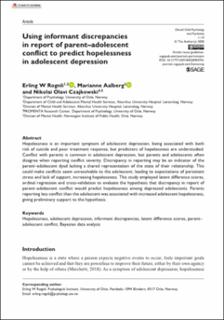Using informant discrepancies in report of parent–adolescent conflict to predict hopelessness in adolescent depression
| dc.contributor.author | Rognli, Erling | |
| dc.contributor.author | Aalberg, Marianne | |
| dc.contributor.author | Czajkowski, Nikolai Olavi | |
| dc.date.accessioned | 2023-05-08T10:43:59Z | |
| dc.date.available | 2023-05-08T10:43:59Z | |
| dc.date.created | 2020-11-06T12:43:59Z | |
| dc.date.issued | 2020 | |
| dc.identifier.issn | 1359-1045 | |
| dc.identifier.uri | https://hdl.handle.net/11250/3067002 | |
| dc.description.abstract | Hopelessness is an important symptom of adolescent depression, being associated with both risk of suicide and poor treatment response, but predictors of hopelessness are understudied. Conflict with parents is common in adolescent depression, but parents and adolescents often disagree when reporting conflict severity. Discrepancy in reporting may be an indicator of the parent–adolescent dyad lacking a shared representation of the state of their relationship. This could make conflicts seem unresolvable to the adolescent, leading to expectations of persistent stress and lack of support, increasing hopelessness. This study employed latent difference scores, ordinal regression and cross-validation to evaluate the hypothesis that discrepancy in report of parent–adolescent conflict would predict hopelessness among depressed adolescents. Parents reporting less conflict than the adolescent was associated with increased adolescent hopelessness, giving preliminary support to the hypothesis. | |
| dc.language.iso | eng | |
| dc.subject | Klinisk psykologi | |
| dc.subject | Clinical psychology | |
| dc.title | Using informant discrepancies in report of parent–adolescent conflict to predict hopelessness in adolescent depression | |
| dc.type | Peer reviewed | |
| dc.type | Journal article | |
| dc.description.version | publishedVersion | |
| dc.description.version | publishedVersion | |
| dc.source.journal | Clinical Child Psychology and Psychiatry | |
| dc.identifier.doi | 10.1177/1359104520969761 | |
| dc.identifier.cristin | 1845603 | |
| cristin.ispublished | true | |
| cristin.fulltext | original | |
| cristin.fulltext | original | |
| cristin.qualitycode | 1 |
Files in this item
This item appears in the following Collection(s)
-
Artikler [5068]
-
Publikasjoner fra CRIStin FHI [7544]
